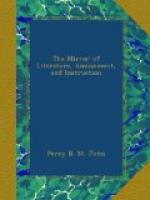[3] Boswell, vol. i. p. 14.
[4] Johnson, in his Dictionary,
defines excise “a hateful tax,
levied
upon commodities, and adjudged not by the common
judges
of property, but by wretches hired by those
to
whom
excise is paid;” and, in the Idler (No.
65) he
calls
a commissioner of excise “one of the lowest
of
all
human beings.” This violence of language
seems so
little
reasonable, that the editor was induced to suspect
some
cause of personal animosity; this mention of
the
trade
in parchment (an excisable article) afforded
a
clue,
which has led to the confirmation of that suspicion.
In
the records of the Excise Board is to be found the
following
letter, addressed to the supervisor of excise at
Lichfield:—“July
27, 1725—The commissioners received
yours
of the 22nd instant; and since the justices would
not
give judgment against Mr. Michael Johnson, the
tanner,
notwithstanding the facts were fairly against
him,
the board direct that the next time he offends, you
do
not lay an information against him, but send an
affidavit
of the fact, that he may be prosecuted in the
Exchequer.”
It does not appear whether he offended again,
but
here is sufficient cause of his son’s animosity
against
commissioners of excise, and of the allusion in
the
Dictionary to the special jurisdiction under
which
that
revenue is administered. The reluctance of the
justices
to convict will not appear unnatural, when it is
recollected
that Mr. Johnson was, this very year, chief
magistrate
of the city.—Note to Boswell, by Croker,
vol.
i.
Johnson’s mother was a woman of distinguished understanding and piety; and to her must be ascribed those early impressions of religion upon the mind of her son, from which the world afterwards derived so much benefit. Johnson was the elder of two sons, the younger of whom died in his infancy.
Of Johnson’s childhood at Lichfield it would not be difficult to assemble many interesting particulars: from his listening to Dr. Sacheverel, when he was but three years old; his being first taught to read English by Dame Oliver, a widow who kept a school for young children in Lichfield, and who gave him a present of gingerbread, and said he was the best scholar she ever had; to his arrival in London with the unfinished tragedy of Irene in his pocket, and the prospect of a slender engagement with Cave of the Gentleman’s Magazine. One thing is certain, that however unpromising were Johnson’s early days at Lichfield, he ever retained a warm affection for his native city, and which, by a sudden apostrophe, under the word Lich, he introduces with reverence into his immortal work, the ENGLISH DICTIONARY: Salve magna parens. (Boswell.) His last visit was in his 75th year when he writes to Boswell:—“I came to Lichfield, and found every body glad enough to see me.”




